#u. s. constitution
Photo

2K notes
·
View notes
Text
New Post has been published on Books by Caroline Miller
New Post has been published on https://www.booksbycarolinemiller.com/musings/one-true-thing-about-democracy/
One True Thing About Democracy

Many artists have recorded the song “You’ve Got to be Taught” from the musical South Pacific. Barbara Streisand is among them. It’s a song about hate. Actor John Kerr in the original film version explains. ”It happens after you’re born.” The philosopher John Locke would have agreed. He believed human nature began as a blank page upon which experience imprinted its truths. Hate wasn’t innate. His older contemporary, Thomas Hobbes demurred. Humankind was born with a brutish nature, he insisted. The 2022 election has reopened the question. A recent study of outcomes revealed a stunning fact. A large swath of voters across the political spectrum favored uncompromising leaders who were decisive. What’s more these voters would abandon democracy if autocracy protected people like themselves from groups that threatened their values or status. As evidence of this truth, the American electorate sent more than 100 incumbent and newly elected members to Congress who cast doubts about the electoral process, and who affirmed the 2020 election was “rigged.” Equally troubling is the plethora of Internet hate sites that continue to grow. A recent Pew Report noted that 46% of teens use the web “almost constantly,” giving a boost to fearmongers and misogynists like Andre Tate. Tate describes himself as a “life coach.” One of his messages to impressionable minds is that women bring rape upon themselves. Do Tate’s remarks and those of others like him prove humans have a dark nature? The prevalence of psychopaths in our society might give us pause. Or, do we learn from the example of tyrants? Vladimir Putin is one. His Ukraine invasion has decimated many cities, reducing their schools, libraries, and hospitals to rubble. What lesson does he teach? He owns many palaces while nightly, newscasters show us images of his victims–Ukranian mothers with babies slung on their hips pleading for food. Is Putin incapable of remorse? Has he reduced his life to a game of winning and losing? And, is that enough? One Russian mercenary thinks it is. He makes headlines by beating his chest and challenging Ukraine’s president to a duel. Tomorrow, I will fly a MIG-29. If you so desire, let’s meet in the skies. If you win, you take Artyomovsk (Bakhmut). If not, we advance till (the river) Dnipro. Does brutish sentiment reflect a diminished intellect? Do people who behave like an animal think like an animal? History suggests otherwise. Tyrants like Caligula, Joseph Stalin, Mao Zedong, Pol Pot, and Hitler aren’t counted as fools. Studies suggest wrong-doing may be an offshoot of creativity. It’s a talent that allows reprobates to offer excuses to assuage their conscience. Why did Putin invade Ukraine? To rid the country of Nazis. Despite Locke and Hobbes, we humans know little about our nature. We enter the world with two fears, a fear of falling and loud noises. Do we extrapolate other fears from those? Or is fear more biological than philosophers imagined? Studies suggest it is innate, a neurological response to threat. What we do know is that it promotes violence and hatred. To those who would throw away our democracy, I ask that first, they appreciate its value as a bulwark against fear. To secure the Blessings of Liberty to ourselves and our Posterity are the opening lines of the U. S. Constitution. They hold the promise of universal suffrage and equal justice under the law. The ambition is noble and represents the best that is in us. Preserving that ambition exacts a price, however. We are obliged to make room for diversity and to respect habits that to some seem foreign. Yet to deprive equality to any individual or group destroys our mutual protection. As a consequence, we abandon ourselves to the law of the jungle. Or, we surrender our freedom to a dictator. Whether hate must be taught or is part of our brutish nature, we transcend both when we hunger for justice. One day, we may prove to be worthy of the democracy we have fashioned. Till then, we must guard against fear. Democracy demands resilience. That is its one true thing.
#America's promise of equality#Andre Tate#Are tyrants capable of remorse?#Are tyrants fools?#creativity and mischief#devastation in Ukraine#hate on the internet#John Kerr#John Locke#lyrics to You've got to be taught#Pew research on teens and the media#psychopaths prevelant in society#ridding Ukraine of Nazis#South Pacific#study of the 2020 election#The nature of humans#the two innate fears#Thoimas Hobbes#U. S. Constitution#Vladimir Putin#war as a game
0 notes
Text
JANES ROE AND THE ELDERS
JANES ROE AND THE ELDERS
“There were a lot of gods. Gods always come in handy, they justify almost anything.”― Margaret Atwood
This rare venture into editorial cartoonland and theology is about a contemporary issue: the United States Supreme Court’s leaked draft regarding its potentially overturning of the 1973 Roe v. Wade decision. That opinion stated that under most circumstances obtaining an abortion fell under the…

View On WordPress
#art#authoritarianism#cartoons#daniel 13#democracy#freedom#justice#MAGA#roe#scopophillia#sexism#supreme court#susanna and the elders#theocracy#theology#u. s. constitution
1 note
·
View note
Text
I’m losing my mind SO HARD over full-body shots of Hua Cheng,
because T H I S is my precious little novel-accurate stickman
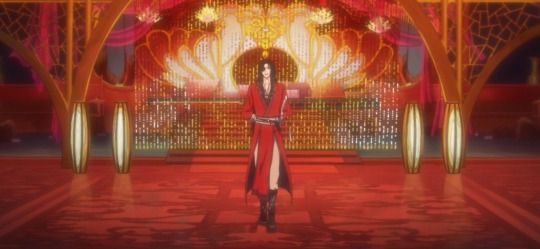
who’s got SUCH “Top or bottom, what’s the difference?” ENERGY

just look at him, oh my god

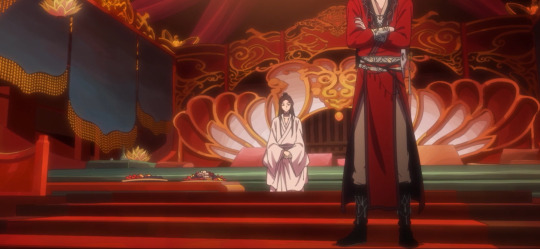
I mean there’s nothing wrong in wanting to draw a beefy sexy wardrobe of a man
but this is his true form
and he has literally been malnourished his whole mortal life
and a good design tells you a story
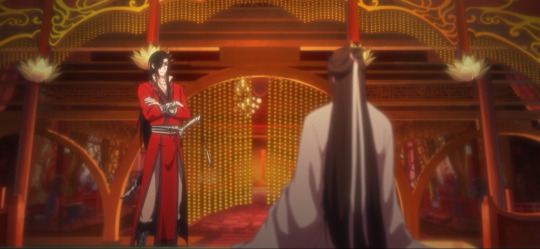
and while size difference is cool, i love that their similar constitution highlights them being equal

in strength, in mind, in complexity
because that’s what hua cheng always wanted - to catch up to xie lian
and that’s what they both need

because just look at them go together
they radiate equality, understanding, mutuality, genuine human connection
and i adore them for this, and i adore donghua for this u-y
#heaven officials blessing#tian guan ci fu#tgcf#tgcf donghua#tgcf season 2#tgcf thoughts#tgcf analysis#hualian#xie lian#hua cheng
784 notes
·
View notes
Note
hi if u don’t mind me asking, could u please elaborate on your thoughts on the critique of contemporary anti-intellectualism (specifically on social media)? i’m legitimately curious and enjoy a lot of ur analysis and commentary i mean this in good faith :)
Broadly speaking, the philosophical concept of anti-intellectualism tends to critically describe the ideological + rhetorical relegation of intellectual production to an elitist practice fundamentally at odds with the interests of the layman; and, crucially, the treatment of these categories as fixities. I disagree with the propositions of that philosophical discourse as well, but that’s not always the form that the discourse takes on this website. On here, ‘anti-intellectualism’ is more of a vague catch-all used to describe anything from people who express frustration with the literary canon & mainstream schooling in ways that don’t coddle the sensibilities of people with literature degrees to people who come out with outright fascistic views on provocative art; it attempts to corral what are in fact very disparate positions and perspectives under the umbrella of insufficient ‘intellect,’ often shorthanded to ‘reading comprehension’ or ‘media literacy’ (or ‘[in]curiosity,’ a new favourite) without any materialist investigation into what we mean when we talk about intellect and literacy and a lack thereof or whether this is a politically expedient description of the dynamic[s] in question.
When I say materialism, I mean it in the Marxist sense, ie. as a counter to idealism—because what’s being described here is a fundamentally idealist (and therefore useless) position. The discourse of anti-intellectualism as it exists on this website relies on idealist propositions—people lack curiosity, they lack interest, they are ‘lazy,’ they are ‘illiterate’ where ‘illiterate’ is not a value-neutral statement about one’s relationship to a socially constituted ‘literacy’ but communicating a moral indictment, at its worst they are ‘stupid,’ ‘idiots’—these descriptors rely on an assumption of immutable internal properties rather than providing a materialist description for why things are the way that they are. These aren’t actionable descriptors; at best they’re evasive because they circumvent serious interrogation of the conditions they’re describing, at worst they’re harbingers of an inclination towards eugenicist rhetoric. The discourse casts those who are ‘illiterate’—which in this capacity means those who fail to perform conventional literacy, who lack a traditional education, who don’t demonstrate sufficient interest in classic literature—or the more unkind ‘stupid’ (which, frankly, is what people want to say when they say ‘illiterate’ or ‘incurious’ anyway, lmao) as socially disposable and places the onus of changing one’s behaviour (so as to not be cast as illiterate/incurious/stupid) on them rather than asking what conditions have produced XYZ discourse of social disposability and responding with compassion and ethical diligence; I hope I don’t have to explain why this is eugenicist.
The discourse also lacks an ability to coherently describe what is meant by the ‘intellectualism’ in question—after all, merely appealing to ‘intellectualism’ is a similarly idealist rhetorical move if you don’t have the material grounding to back it up—and indeed tends to dismiss legitimate critiques of intellectual + cultural production as ‘anti-intellectual.’ People love to talk about ‘literacy,’ but don’t like expounding on what they’re actually describing when they do so—the selection of traits and actions that come together to constitute a correct demonstration of ‘literacy’ are built on the bedrock of eg. an ability to thrive within the school system (a mechanism of social control and stratification), fluently speak the dominant language by which this ‘literacy’ is being assessed (in online spaces like Tumblr this is usually English), and engage with the ‘right’ texts in the ‘right’ ways where ‘right’ means ‘invested with legitimacy and authority by the governing body of the academy.’ Literacy is used as a metric of assimilation into hegemonic society by which immigrant and working-class children are made rhetorically disposable unless they demonstrate their ability to integrate into the hegemonic culture (linked post talks about immigrant families being rendered ‘illiterate’ as a tactic of racism in France, but the same applies to the US, UK, etc); similarly, disabled people who for whatever reason will never achieve the level of ‘literacy’ required to not have Tumblr users doing vagueposts about how you deserve a eugenicist death for watching a kids’ show are by this discourse rendered socially disposable, affirming the paradigms which already make up their experience under a social system which reifies ableism in order to sustain itself. (This includes, by the way, the genre of posts making fun of the idea that someone with ADHD could ever struggle with reading theory.) ‘Literacy’ as the ability to understand and respond to a text is difficult and dispersed according to disparate levels of social access, and a lack of what we call literacy is incredibly shameful; any movement towards liberation (and specifically liberatory pedagogy) worth its salt needs to challenge the stigma against illiteracy, but this website’s iteration of ‘anti-intellectualism’ discourse seems to only want to reaffirm it.
Similarly, the discourse dismisses out of hand efforts to give a materialist critique of the academy and the body of texts that make up the ‘canon’—I’m thinking of a post I saw literally this morning positing a hypothetical individual’s disinterest in reading canonical (“classic”) literature as an “anti-intellectual” practice which marked them as an “idiot.” (Obviously, cf. above comments re. ‘stupidity,’ ‘idiocy’ as eugenicist constructions.) People who will outright call themselves Marxists seem to get incredibly uncomfortable at the suggestion that there are individuals for whom the literary canon is not even slightly interesting and who will never in their lives engage with it or desire to engage with it, and this fact does not delegitimise their place in revolutionary thinking and organising (frankly, in many areas, it strengthens it); they seem determined to continue to defer to the canon as a signifier of authority and therefore value, rather than acknowledging its role as a marker of class and classed affects and a rubric by which civility (cf. linked post above) could be enforced. (I believe the introduction to Chris Baldick’s The Social Mission of English Criticism touches on this dimension of literary studies as a civilising mission of sorts, as well as expounding on the ways in which ‘literary studies’ as we presently understand it is a nineteenth-century phenomenon responding to the predictable nineteenth-century crises and contradictions.) People will defer to, for example, Dumas, Baldwin, Morrison, to contravene the idea that the literary canon is made up of ‘straight white men,’ without appreciating that this is a hugely condescending way to talk about their work, that this collapses three very different writers into the singular category of ‘Black canonical writer’ and thus stymies engagement with their work at any level other than that of 'Black canonical literature' (why else put Dumas and Morrison in the same sentence, unless as a cheap rhetorical ‘gotcha’? I like both but they’re completely different writers lmfao), and that this excises from the sphere of legitimacy those Black writers who don’t make it into the authorising space of the canon; and, of course, reaffirms the canon’s authenticity and dismisses out of hand the critique of loyalty to hegemony that the ‘straight white men’ aphorism rightly imposes.
The discourse operates on a unilateral scale by which the more ‘literacy’ (ie. ability to speak the language of the literati) one has, the greater their moral worth, and a lack of said ‘literacy’ indicates the inverse. This overlooks the ways in which the practice of literary criticism wholly in line with what these people would call ‘intellectualism’ has historically been wielded as a tactic of reactionary conservatism; one only has to look at the academic output of Harold Bloom for examples of this. People will often pay lipservice to the hegemony of the academy and the practices by which only certain individuals are allowed access to intellectual production (stratified along classed + racialised lines, of course), but fail to really internalise this idea in understanding that the critical practices they afford a significant degree of legitimacy are inextricable from the academy from which they emerged, and that we can and should be imagining alternative forms of pedagogy and criticism taking place away from sites which restrict access based on allegiance to capital. Part of my communism means believing in the abolition of the university; this is not an ‘anti-intellectual’ position but a straightforwardly materialist one.
A final core problem with the 'anti-intellectualism' discourse is that it's obscurantist. As I explained above, it posits the problem with eg. poor engagement with theoretical concepts, challenging art, etc., to be one of 'intellect' and 'curiosity,' idealist rather than materialist states. In practice, the reasons behind what gets cast as 'anti-intellectualism' are very disparate. Sometimes, we're talking about a situation wherein (as I explained above) someone lacks 'literacy'; sometimes we're talking about the reason for someone's refusal to engage with and interpret art with care and deference being one of bigotry (eg. racist dismissals of non-white artists' work, misogynistic devaluing of women's work, etc.); sometimes we're talking about a reactive discomfort with marginalised people communicating difficult concepts online as a 'know-your-place' response (eg. backlash against 'jargon' on here is almost always attacking posts from/about marginalised people talking about their oppression, with the attacks coming from people who have failed to properly understand that oppression; I've been called a jargonistic elitist for talking about antisemitism, I've seen similar things happen to mutuals who talk about racism and transmisogyny). All of these are incredibly different situations that require incredibly different responses; the person who doesn't care to engage with a text in a way that an English undergrad might because doing so doesn't interest them or they lack the requisite skill level is not comparable to the person who doesn't care to engage with a text because they don't respect the work of a person of colour enough to do so. Collapsing these things under the aegis of 'anti-intellectualism' lacks explanatory power and fails to provide a sufficient actionable response.
Ultimately, the discourse is made up of a lot of people who are very high on their own capabilities when it comes to literary analysis (which, as others have pointed out, seems to be the only arena where all this ever takes place, despite the conventional understanding of ‘media literacy’ referring as much to a discerning eye for propaganda and misinformation as an ability to churn out a cute little essay on Don Quixote) and have managed to find an acceptable outlet for their dislike of anyone who lacks the same, and have provided retroactive justification in the form of the claim that not only is [a specific form of] literary analysis [legible through deference to the authority of the literary canon & the scholarship of the nineteenth century and onward surrounding it] possible for everyone, it is in fact necessary in order to access the full breadth of one’s humanity such that an absence thereof reveals an individual as subhuman and thus socially disposable. A failure to be sufficiently literate is only ever a choice and a personal failing, which is how this discourse escapes accountability for the obviously bigoted presumptions upon which it rests. In this, all materialism is done away with; compassion is done away with, as it becomes possible to describe the multiplicity of reasons why someone cannot or does not demonstrate ‘literacy’ in X, Y or Z ways in the sum total of a couple of adjectives; nothing productive comes of this discourse but a reassertion of the conditions of hegemony in intellectual practice and the bolstering of the smugness of a few people at the expense of alienating everyone else.
As I’ve said countless times before, the way to counteract what we might perceive as ‘incuriosity’ or disinterest in challenging texts is to talk about these challenging texts and our approaches to them as often as we can, to make the pedagogical practices that are usually kept behind the walls of the academy as widely accessible as possible (and to adjust our pedagogy beyond the confines of ideological hegemony that the academy imposes), and to encourage a culture by which people feel empowered to share their thoughts, discuss, ask questions, and explore without being made to feel ashamed for not understanding something. The people who cry ‘anti-intellectualism’ because they saw someone on Tiktok express a disinterest in reading Jane Eyre are accomplishing none of this.
993 notes
·
View notes
Text
But by the end of my five years [as a copy editor], I felt intellectually and psychologically worn down by the labor I logged on my biweekly timesheets. Whatever roller-rink of neurons helped me spot aberrations from convention had grown practiced and strong, and it was difficult to read any unconventional sentence without reflexively rearranging it into a more conventional form.
Something had shrunken and withered in me, for having directed so much of my attention away from the substance of the stories I read and into their surface. Few people in our office, let alone outside its walls, would notice the variation in line spacing, the fact that Jesus’ was lacking its last, hard “s,” or whatever other reason we were sending the proofs to be printed again—and if they did, who the fuck cared? [....]
I can’t help wondering, though, whether there wasn’t something insidious in the way we worked—some poison in our many rounds of minute changes, in our strained and often tense conversations about ligatures and line breaks, in our exertions of supposedly benign, even benevolent, power; if those polite conversations constituted a covert, foot-dragging protest against change, an insistence on the quiet conservatism of the liberal old guard, and if they were a distraction from the conversations that might have brought meaningful literary or linguistic change about. In fact, I sense myself enacting the same foot-dragging here.
It’s fun—it’s dangerously pleasing—to linger in the minutiae of my bygone copyediting days, even if, by the time I left that job to teach college writing full-time, I was convinced that “correcting” “errors” of convention most readers would never notice was the least meaningful work a person could possibly do. I’m writing this, however, to ask whether copyediting as it’s been practiced is worse than meaningless: if, in fact, it does harm.
*
Do we really need copyediting? I don’t mean the basic clean-up that reverses typos, reinstates skipped words, and otherwise ensures that spelling and punctuation marks are as an author intends. Such copyediting makes an unintentionally “messy” manuscript easier to read, sure.
But the argument that texts ought to read “easily” slips too readily into justification for insisting a text working outside dominant Englishes better reflect the English of a dominant-culture reader—the kind of reader who might mirror the majority of those at the helm of the publishing industry, but not the kind of reader who reflects a potential readership (or writership) at large.
A few years before leaving copyediting, I began teaching a scholarly article I still read with students today, Lee A. Tonouchi’s “Da State of Pidgin Address.” Written in Hawai’ian Creole English, or Pidgin, it asks whether what “dey say” is true: “dat da perception is dat da standard english talker is going automatically be perceive fo’ be mo’ intelligent than da Pidgin talker regardless wot dey talking, jus from HOW dey talking.” The article leaves many students questioning the assumptions they began reading it with: its effect is immediate, personal, and profound.
In another article I pair it with, “Should Writers Use They Own English,” Vershawn Ashanti Young answers Tonouchi’s implicit question, writing, “don’t nobody’s language, dialect, or style make them ‘vulnerable to prejudice.’ It’s ATTITUDES.” Racial difference and linguistic difference, Young reminds us, are intertwined, and “Black English dont make it own-self oppressed.”
It’s clear that copyediting as it’s typically practiced is a white supremacist project, that is, not only for the particular linguistic forms it favors and upholds, which belong to the cultures of whiteness and power, but for how it excludes or erases the voices and styles of those who don’t or won’t perform this culture. Beginning with an elementary school teacher’s red pen, and continuing with agents, publishers, and university faculty who on principle turn away work that arrives on their desk in unconventionally grammatical or imperfectly punctuated form, voices that don’t mimic dominance are muffled when they get to the page and also before they get there—as schools, publishers, and their henchmen entrench the idea that those writing outside convention are not writing “well,” and therefore ought not set their voices to paper at all. [...]
Like other emissaries of the powerful (see, e.g., the actual police), copy editors often wield what power they do have unpredictably, teetering between generous attention and brute, insistent force. You saw this in the way our tiny department got worked up over the stubbornness of an editor or author who had dug in their heels: their resistance was a threat, sometimes to our suspiciously moral-feeling attachment to “correctness,” sometimes to our aesthetics, and sometimes to our sense of ourselves. [...]
There’s a flip side, if it’s not already obvious, to the peculiar “respect” I received in that dusty closet office at twenty-two. A 2020 article in the Columbia Journalism Review refers casually to “fusspot grammarians and addled copy editors”; I’m not the only one who imagines the classic copy editor as uncreative, neurotic, and cold.
I want to say they’re the publishing professionals most likely, in the cultural imagination, to be female, but that doesn’t feel quite right: agents and full-on editors are female in busty, sexy ways, while copy editors are brittle, unsexed. Their labor nevertheless shares with other typically female labors a concern with the small and the surface, those aspects of experience many of us are conditioned to dismiss.
I’m willing to bet, too, that self-professed “grammar snobs” rarely come from power themselves—that there is a note of aspirational literariness in claiming the identity as such. [...]
It makes me wonder if, in renouncing my job when I left it—in calling copyediting the world’s least meaningful work—I might have been reenacting some of the literary scene’s most entrenched big-dick values: its insistence on story over surface (what John Gardner called the “fictional dream”), on anti-intellectualism but also the elitist cloak of it-can-never-be-taught. The grammar snob’s aspiration and my professor’s condescension bring to mind the same truism: that real power never needs to follow its own rules. [...]
Copyediting shares with poetry a romantic attention to detail, to the punctuation mark and the ordering of words. To treat someone else’s language with that fine a degree of attention can be an act of love. Could there be another way to practice copyediting—less attached to precedent, less perseverating, and more eagerly transgressive; a practice that, to distinguish itself from the quietly violent tradition from which it arises, might not be called “copyediting” at all; a practice that would not only “permit” but amplify the potential for linguistic invention and preservation in any written work?
--- Against Copyediting: Is It Time to Abolish the Department of Corrections? Helen Betya Rubinstein on Having Power Over More Than Just Commas
#linguistics#literature#copyediting#copyeditor#prescriptivism#grammar snobbery#editing#writing#publishing
504 notes
·
View notes
Text

EXCELLENT QUESTION!
Edit:
It was pointed out that since the U. S. is a Constitutional Republic, and NOT a democracy, that Trump is, in fact, a danger to democracy. I concur! He is the one needed to protect and restore our Republic to "We The People"! (See the notes)
96 notes
·
View notes
Photo
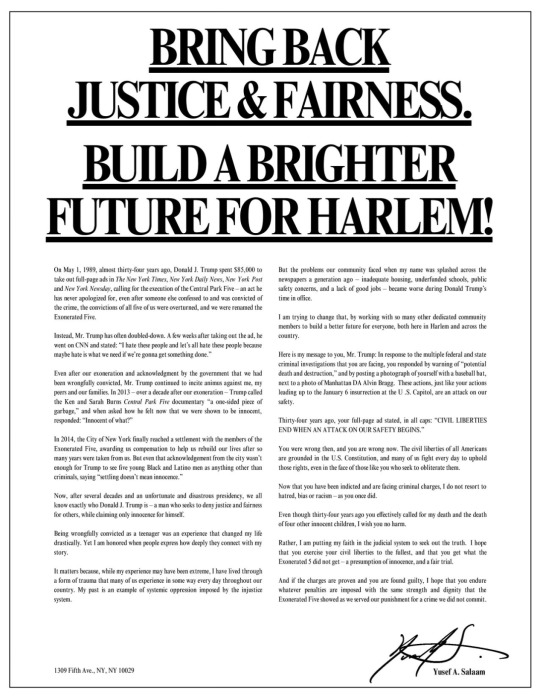
Almost thirty-four years after Donald Trump took out a full-page ad in New York newspapers calling for the return of the death penalty in the wake of the case of a group of young African-American men branded the “Central Park Five”, and a few days after Trump was charged with thirty-four felony counts, one of the now-Exonerated Five took out a full-page ad of his own. The full text follows:
BRING BACK JUSTICE & FAIRNESS. BUILD A BRIGHTER FUTURE FOR HARLEM!
On May 1, 1989, almost thirty-four years ago, Donald J. Trump spent $85,000 to take out full-page ads in The New York Times, New York Daily News, New York Post and New York Newsday, calling for the execution of the Central Park Five — an act he has never apologized for, even after someone else confessed to and was convicted of the crime, the convictions of all five of us were overturned, and we were renamed the Exonerated Five.
Instead, Mr. Trump has often doubled-down. A few weeks after taking out the ad, he went on CNN and stated: "I hate these people and let's all hate these people because maybe hate is that we need if we're gonna get something done."
Even after our exoneration and acknowledgment by the government that we had been wrongfully convicted, Mr. Trump continued to incite animus against me, my peers and our families. In 2013 — over a decade after our exoneration — Trump called the Ken and Sarah Burns Central Park Five documentary "a one-sided piece of garbage," and when asked how he felt now that we were shown to be innocent, responded: "Innocent of what?"
In 2014, the City of New York finally reached a settlement with the members of the Exonerated Five, awarding at compensation to help us rebuild our lives after so many years were taken from us. But even that acknowledgement from the city wasn't enough for Trump to see five young Black and Latino men as anything other than criminals, saying "settling doesn't mean innocence."
Note, after several decades and an unfortunate and disastrous presidency, we all know exactly who Donald J. Trump is — a man who seeks to deny justice and fairness for others, while claiming only innocence for himself.
Being wrongfully convicted as a teenager was an experience that changed my life drastically. Yet I am honored when people express how deeply they connect with my story.
It matters because, while my experience may have been extreme, I have lived through a form of trauma that many of us experience in some way every day throughout our country. My past is an example of systemic oppression imposed by the injustice system.
But the problems our community faced when my name was splashed across the newspapers a generation ago — inadequate housing, underfunded schools, public safety concerns, and a lack of good jobs — became worse during Donald Trump's time in office.
I am trying to change that, by working with so many other dedicated community members to build a better future for everyone, both here in Harlem and across the country.
Here is my message to you, Mr. Trump: In response to the multiple federal and state criminal investigations that you are facing, you responded by warning of "potential death and destruction," and by posting a photograph of yourself with a baseball bat, next to a photo of Manhattan DA Alvin Bragg. These actions, just like your actions leading up to the January 6 insurrection at the U .S. Capitol, are an attack on our safety.
Thirty-four years ago, your full-page ad stated, in all caps: "CIVIL LIBERTIES END WHEN AN ATTACK ON OUR SAFETY BEGINS."
You were wrong then, and you are wrong now. The civil liberties of all Americans are grounded in the U.S. Constitution, and many of us fight every day to uphold those rights, even in the face of those like you who seek to obliterate them.
Now that you have been indicted and are facing criminal charges, I do not resort to hatred, bias or racism — as you once did.
Even though thirty-four years ago you effectively called for my death and the death of four other innocent children, I wish you no harm.
Rather, I at putting my faith in the judicial system to seek out the truth. I hope that you exercise your civil liberties to the fullest, and that you get what the Exonerated 5 did not get — a presumption of innocence, and a fair trial.
And if the charges are proven and you are found guilty, I hope that you endure whatever penalties are imposed with the same strength and dignity that the Exonerated Five showed as we served our punishment for a crime we did not commit.
--Yusef A. Salaam
246 notes
·
View notes
Text
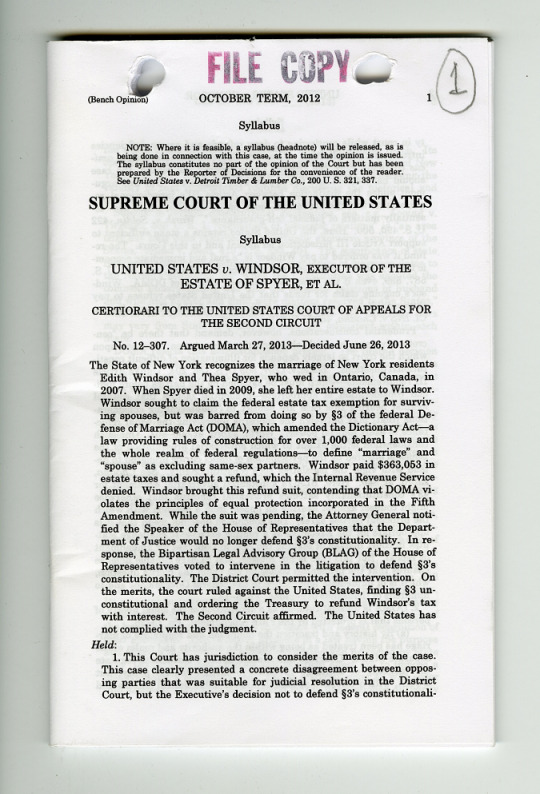
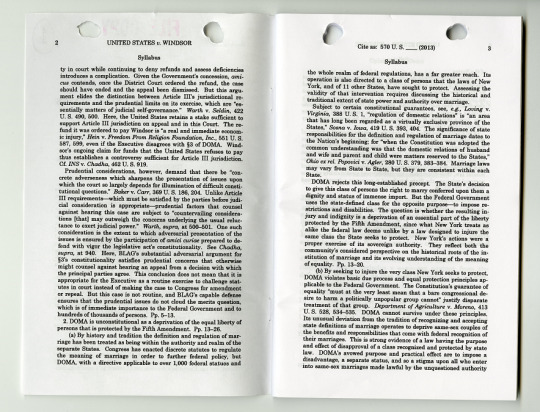
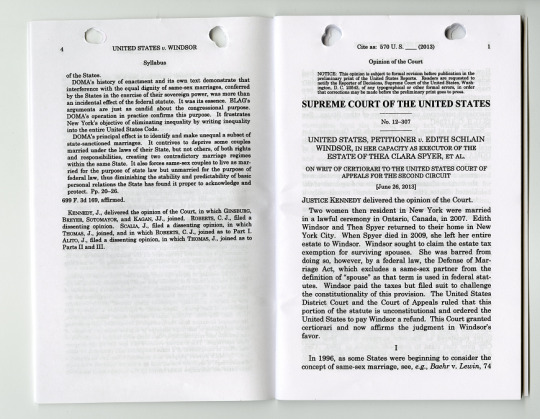
The Supreme Court ruled that the Defense of Marriage Act was unconstitutional on June 26, 2013.
In U.S. v Windsor, SCOTUS held that the federal government could not discriminate against same-sex couples.
Record Group 267: Records of the Supreme Court of the United States
Series: Appellate Jurisdiction Case Files
Transcription:
[Stamped: " FILE COPY "]
(Bench Opinion) OCTOBER TERM, 2012 1 [Handwritten and circled " 1" in upper right-hand corner]
Syllabus
NOTE: Where it is feasible, a syllabus (headnote) will be released, as is
being done in connection with this case, at the time the opinion is issued.
The syllabus constitutes no part of the opinion of the Court but has been
prepared by the Reporter of Decisions for the convenience of the reader.
See United States v. Detroit Timber & Lumber Co., 200 U.S. 321, 337.
SUPREME COURT OF THE UNITED STATES
Syllabus
UNITED STATES v. WINDSOR, EXECUTOR OF THE
ESTATE OF SPYER, ET AL.
CERTIORARI TO THE UNITED STATES COURT OF APPEALS FOR
THE SECOND CIRCUIT
No. 12-307. Argued March 27, 2013---Decided June 26, 2013
The State of New York recognizes the marriage of New York residents
Edith Windsor and Thea Spyer, who wed in Ontario, Canada, in
2007. When Spyer died in 2009, she left her entire estate to Windsor.
Windsor sought to claim the federal estate tax exemption for surviv-
ing spouses, but was barred from doing so by §3 of the federal Defense
of Marriage Act (DOMA), which amended the Dictionary Act---a
law providing rules of construction for over 1,000 federal laws and
the whole realm of federal regulations-to define "marriage" and
"spouse" as excluding same-sex partners. Windsor paid $363,053 in
estate taxes and sought a refund, which the Internal Revenue Service
denied. Windsor brought this refund suit, contending that DOMA vi-
olates the principles of equal protection incorporated in the Fifth
Amendment. While the suit was pending, the Attorney General notified
the Speaker of the House of Representatives that the Department
of Justice would no longer defend §3's constitutionality. In re-
sponse, the Bipartisan Legal Advisory Group (BLAG) of the House of
Representatives voted to intervene in the litigation to defend §3's
constitutionality. The District Court permitted the intervention. On
the merits, the court ruled against the United States, finding §3 un-
constitutional and ordering the Treasury to refund Windsor's tax
with interest. The Second Circuit affirmed. The United States has
not complied with the judgment.
Held:
1. This Court has jurisdiction to consider the merits of the case.
This case clearly presented a concrete disagreement between oppos-
ing parties that was suitable for judicial resolution in the District
Court, but the Executive's decision not to defend §3's constitutionali-
[page 2]
2 UNITED STATES v. WINDSOR
Syllabus
ty in court while continuing to deny refunds and assess deficiencies
introduces a complication. Given the Government's concession, ami-
cus contends, once the District Court ordered the refund, the case
should have ended and the appeal been dismissed. But this argu-
ment elides the distinction between Article Ill's jurisdictional re-
quirements and the prudential limits on its exercise, which are "es-
sentially matters of judicial self-governance." Warth v. Seldin, 422
U. S. 490, 500. Here, the United States retains a stake sufficient to
support Article III jurisdiction on appeal and in this Court. The re-
fund it was ordered to pay Windsor is "a real and immediate econom-
ic injury," Hein v. Freedom From Religion Foundation, Inc., 551 U. S.
587, 599, even if the Executive disagrees with §3 of DOMA. Wind-
sor's ongoing claim for funds that the United States refuses to pay
thus establishes a controversy sufficient for Article III jurisdiction.
Cf. INS v. Chadha, 462 U. S. 919.
Prudential considerations, however, demand that there be "con-
crete adverseness which sharpens the presentation of issues upon
which the court so largely depends for illumination of difficult consti-
tutional questions." Baker v. Carr, 369 U. S. 186, 204. Unlike Article
III requirements---which must be satisfied by the parties before judi-
cial consideration is appropriate---prudential factors that counsel
against hearing this case are subject to "countervailing considera-
tions [that] may outweigh the concerns underlying the usual reluc-
tance to exert judicial power." Warth, supra, at 500-501. One such
consideration is the extent to which adversarial presentation of the
issues is ensured by the participation of amici curiae prepared to de-
fend with vigor the legislative act's constitutionality. See Chadha,
supra, at 940. Here, BLAG's substantial adversarial argument for
§3's constitutionality satisfies prudential concerns that otherwise
might counsel against hearing an appeal from a decision with which
the principal parties agree. This conclusion does not mean that it is
appropriate for the Executive as a routine exercise to challenge stat-
utes in court instead of making the case to Congress for amendment
or repeal. But this case is not routine, and BLAG's capable defense
ensures that the prudential issues do not cloud the merits question,
which is of immediate importance to the Federal Government and to
hundreds of thousands of persons. Pp. 5-13.
2. DOMA is unconstitutional as a deprivation of the equal liberty of
persons that is protected by the Fifth Amendment. Pp. 13--26.
(a) By history and tradition the definition and regulation of mar-
riage has been treated as being within the authority and realm of the
separate States. Congress has enacted discrete statutes to regulate
the meaning of marriage in order to further federal policy, but
DOMA, with a directive applicable to over 1,000 federal statues and
[NEW PAGE]
Cite as: 570 U.S._ (2013) 3
Syllabus
the whole realm of federal regulations, has a far greater reach. Its
operation is also directed to a class of persons that the laws of New
York, and of 11 other States, have sought to protect. Assessing the
validity of that intervention requires discussing the historical and
traditional extent of state power and authority over marriage.
Subject to certain constitutional guarantees, see, e.g., Loving v.
Virginia, 388 U.S. 1, "regulation of domestic relations" is "an area
that has long been regarded as a virtually exclusive province of the
States," Sosna v. Iowa, 419 U. S. 393, 404. The significance of state
responsibilities for the definition and regulation of marriage dates to
the Nation's beginning; for "when the Constitution was adopted the
common understanding was that the domestic relations of husband
and wife and parent and child were matters reserved to the States,"
Ohio ex rel. Popovici v. Agler, 280 U. S. 379, 383-384. Marriage laws
may vary from State to State, but they are consistent within each
State.
DOMA rejects this long-established precept. The State's decision
to give this class of persons the right to marry conferred upon them a
dignity and status of immense import. But the Federal Government
uses the state-defined class for the opposite purpose---to impose re-
strictions and disabilities. The question is whether the resulting injury
and indignity is a deprivation of an essential part of the liberty
protected by the Fifth Amendment, since what New York treats as
alike the federal law deems unlike by a law designed to injure the
same class the State seeks to protect. New York's actions were a
proper exercise of its sovereign authority. They reflect both the
community's considered perspective on the historical roots of the in-
stitution of marriage and its evolving understanding of the meaning
of equality. Pp. 13--20.
(b) By seeking to injure the very class New York seeks to protect,
DOMA violates basic due process and equal protection principles ap-
plicable to the Federal Government. The Constitution's guarantee of
equality "must at the very least mean that a bare congressional de-
sire to harm a politically unpopular group cannot" justify disparate
treatment of that group. Department of Agriculture v. Moreno, 413
U. S. 528, 534-535. DOMA cannot survive under these principles.
Its unusual deviation from the tradition of recognizing and accepting
state definitions of marriage operates to deprive same-sex couples of
the benefits and responsibilities that come with federal recognition of
their marriages. This is strong evidence of a law having the purpose
and effect of disapproval of a class recognized and protected by state
law. DOMA's avowed purpose and practical effect are to impose a
disadvantage, a separate status, and so a stigma upon all who enter
into same-sex marriages made lawful by the unquestioned authority
[page 3]
4 UNITED STATES v. WINDSOR
Syllabus
of the States.
DOMA's history of enactment and its own text demonstrate that
interference with the equal dignity of same-sex marriages, conferred
by the States in the exercise of their sovereign power, was more than
an incidental effect of the federal statute. It was its essence. BLAG's
arguments are just as candid about the congressional purpose.
DOMA's operation in practice confirms this purpose. It frustrates
New York's objective of eliminating inequality by writing inequality
into the entire United States Code.
DOMA's principal effect is to identify and make unequal a subset of
state-sanctioned marriages. It contrives to deprive some couples
married under the laws of their State, but not others, of both rights
and responsibilities, creating two contradictory marriage regimes
within the same State. It also forces same-sex couples to live as mar-
ried for the purpose of state law but unmarried for the purpose of
federal law, thus diminishing the stability and predictability of basic
personal relations the State has found it proper to acknowledge and
protect. Pp. 20-26.
699 F. 3d 169, affirmed.
KENNEDY, J., delivered the opinion of the Court, in which GINSBURG,
BREYER, SOTOMAYOR, and KAGAN, JJ., joined. ROBERTS, C. J., filed a
dissenting opinion. SCALIA, J., filed a dissenting opinion, in which
THOMAS, J., joined, and in which ROBERTS, C. J., joined as to Part I.
ALITO, J., filed a dissenting opinion, in which THOMAS, J., joined as to
Parts II and III.
[NEW PAGE]
Cite as: 570 U. S. _ (2013) 1
Opinion of the Court
NOTICE: This opinion is subject to formal revision before publication in the
preliminary print of the United States Reports. Readers are requested to
notify the Reporter of Decisions, Supreme Court of the United States, Washington,
D. C. 20543, of any typographical or other formal errors, in order
that corrections may be made before the preliminary print goes to press.
SUPREME COURT OF THE UNITED STATES
No. 12-307
UNITED STATES, PETITIONER v. EDITH SCHLAIN
WINDSOR, IN HER CAPACITY AS EXECUTOR OF THE
ESTATE OF THEA CLARA SPYER, ET AL.
ON WRIT OF CERTIORARI TO THE UNITED STATES COURT OF
APPEALS FOR THE SECOND CIRCUIT
[June 26, 2013]
JUSTICE KENNEDY delivered the opinion of the Court.
Two women then resident in New York were married
in a lawful ceremony in Ontario, Canada, in 2007. Edith
Windsor and Thea Spyer returned to their home in New
York City. When Spyer died in 2009, she left her entire
estate to Windsor. Windsor sought to claim the estate tax
exemption for surviving spouses. She was barred from
doing so, however, by a federal law, the Defense of Mar-
riage Act, which excludes a same-sex partner from the
definition of "spouse" as that term is used in federal stat-
utes. Windsor paid the taxes but filed suit to challenge
the constitutionality of this provision. The United States
District Court and the Court of Appeals ruled that this
portion of the statute is unconstitutional and ordered the
United States to pay Windsor a refund. This Court granted
certiorari and now affirms the judgment in Windsor's
favor.
I
In 1996, as some States were beginning to consider the
concept of same-sex marriage, see, e.g., Baehr v. Lewin, 74
#archivesgov#June 26#2013#2010s#Pride#LGBTQ+#LGBTQ+ history#U.S. v Windsor#Defense of Marriage Act#same-sex marriage#Supreme Court#SCOTUS
143 notes
·
View notes
Note
hi! hope you're doing well <3 do you have any long gallavich ao3 fic recs? can be any rating :)
hi hi! i'm doing alright 🥰 i hope you are too!! 💙
i am... notoriously bad at giving recs, but i'm going to try my best to list a few that live with me at all times (while trying very very very hard to not feel bad for leaving anything out/forgetting anything!)
now, i'm not sure what you constitute as long? so, i've just gathered a few that are over 50k? ok!
completed fics that make me want to shout into the sky:
literally aaaanything by @goodkwuestion but The Increasingly Poor Decisions of Ian Gallagher and The Fine Art of Falling For You have a very special place in my heart!
Dancing After Death by @squidyyy23 - i made audible noises while reading this fic. idk what that tells you, but i hope it explains it.
M8TE by @gallawitchxx - i was all "idk idk idk if i'd be into a/b/o... eeeehhhh" and then this came along! and i- *slams fists on table*
Since We're Alone by @lethargicmick and @buffymilkovich - the way i became irreversibly unhinged by this story... my heart!
Undead Agents of Chaos by @abundanceofnots - god, it's so fun! all the ups and downs. it's so beautiful. so original! Y E S!
and i'd be just silly not to mention Cooperative Gameplay and Like Real People Do by grayola - iconic. full stop.
wips that i love and make me want to punch straight through a wall:
Sweetpea by @whatthebodygraspsnot - my beloved, my heart, my love, my joy, my light! (the fic, the universe, the characters, the author)
wait! and also That 'Redhead Babyface/FUCK U-UP' Duality - if ya wanna get hooked immediately. if ya want flirty banter. if ya want that funny, good, blessed writing style that scratches that itch! dis ees da one!
Tender Hearts and Other Maladies by @whatwouldmickeydo - world building of my dreaaaams!!!
Intro to Quantum Dating by @spoonfulstar - my absolute comfort fic!
Ristretto by @howlinchickhowl - the cooooziest and funniest coffeshop au! it's like a warm hug, i tell you!
Ian Gallagher and All of His Mistakes by toraten - i enjoy me a piece of life fic and this one is just so good!
Love Is a Ballfield by and_i_take_it - obsessed obsessed obsessed will never let this one gooooo!!!!
------
also! @gallavichfanficlibrary is an amazing resource for fic recs! they've got a great tag system that makes things super easy!
and also! *sounding the alarm* everyone feel free to tac on your favorites!
and and also! i hope you're having a lovely day wherever you are! 💙
#please please add your favorites! my brain enjoys and loves but it's also broken alsdkfj#anon i hope you find something to love here!#anon#asks#fic recs#shameless#gallavich
50 notes
·
View notes
Photo

We the People of the United States, in Order to form a more perfect Union, establish Justice, insure domestic Tranquility, provide for the common defence, promote the general Welfare, and secure the Blessings of Liberty to ourselves and our Posterity, do ordain and establish this Constitution for the United States of America.
3 notes
·
View notes
Text
New Post has been published on Books by Caroline Miller
New Post has been published on https://www.booksbycarolinemiller.com/musings/ruminations-on-sex-and-gender/
Ruminations On Sex And Gender

I came across an acronym recently which puzzled me. Someone critical of J. K. Rowling’s position on transgender women accused the writer of being TERF. I had to look up the term and found it means activists who seek to limit full equality for transgender people and exclude trans women from women’s spaces. I was surprised. Nothing I’d read by Rowling suggested she wanted to limit transgender rights. I’m not even sure she wants to exclude them from women’s spaces. A recent poll revealed a majority of women don’t worry about sharing private spaces like bathrooms and dressing rooms with transgender women. What worries them were imposters in stilettos who mean to do them harm. Crimes of this sort may be rare, but to a victim, statistics mean little. Data, in fact, reveals a stunning irony. Transgenders face greater harm in private spaces than women. In any case, Rowling’s fears, as I read them centered on how transgender issues affected women’s rights. A long-time feminist, I decided to examine her arguments. Because the library on sex and gender is vast, this blog will rely on two documents as I review the issue: a) Rowlings’ “manifesto” on sex/gender and b) Scientific American’s article on what science has learned about the subject. Rowling’s View: For the record, literature on problems that arise when transgender men identify as men is scarce. The writer’s essay doesn’t address that question. Her focus is on transgender women, specifically those who self-identify. She raises 5 points to explain why she objects to defining them as women. 1. She fears the erosion of women’s rights, believing that trans-activism will erode the legal definition of sex and replace it with gender. The broadening effect, she assumes, will have negative consequences for women. Except as a physical act, Rowling does not attempt to define sex as opposed to gender, so her argument doesn’t flow from any premise. To be fair, I could find no legal definition of sex either. In many cases, the terms sex and gender are used interchangeably. Here’s one example: Sex may refer to either the gender of individuals in many species that are distinguished as being female or male. Constitutional law considers sex a “suspect classification”, so classifications made by public entities based upon gender are strictly scrutinized for a compelling state interest to support it. 2.Rowling explains that as a former teacher, she wants to safeguard the interest of children. Again, she fails to identify what those interests are. I can only point out that the transgender movement makes the same claim. 3. Rowling also worries that transgender campaigns will affect free speech. She cites the example of two women who lost their jobs because they opposed the transgender movement. That number pales, however, when compared to workplace firings of transgenders. 4. Rowling fears homophobia is driving many women to join the transgender movement. She admits she has no data to support this opinion, but points to social media as an influencer and couples it with patriarchy’s allure [for] escaping womanhood. 5. Her final point is anecdotal. As someone who lived as a battered spouse, she’s uncomfortable with transgender women who have done nothing but self-identify. She isn’t alone in that concern as the poll I cited earlier showed. Scientific American on Sex and Gender: Recent scientific discoveries are testing our understanding of ourselves. As the Scientific American article explains, physiology isn’t a definitive marker for a person’s sex. Possessing a penis or a womb doesn’t make an individual a man or a woman. Nor does the presence of XX and XY chromosomes. The arguments are as follows. Genes within chromosomes can complicate sex identification. …new technologies in DNA sequencing and cell biology are revealing that almost everyone is, to varying degrees, a patchwork of genetically distinct cells, some with a sex that might not match that of the rest of the body…[suggesting] there’s a much greater diversity within male and female, and there’s certainly an area overlap where some people can’t define themselves within the binary structure. As we know, the sex of an embryo is indeterminate during the first 4-5 weeks of gestation, a time in which genes do a mysterious dance to manifest sex. During that time, various combinations of gene expression are possible. What’s more, some scientists suspect sex assignment isn’t immutable. Realignments can occur post-natally without medical intervention due to hormonal changes. Scientists base their suspicion on mice studies. We also know that individuals sometimes possess both male and female genitalia, one external and the other internal. A woman might discover this about herself while undergoing going fertility treatments, for example. Another condition is Mosaicism. With this variant, a person has more than one genetic makeup. Fraternal twins are an example, a case when one embryo carries two different sets of genes. More combinations exist but these are sufficient to explain why biologists see sex as a spectrum rather than binary. If society wants a more definitive standard, it will have to draw a line somewhere along that spectrum to define male and female. It wouldn’t be the first time society has made an arbitrary decision. We award adulthood to individuals when they turn 18 even though the human brain doesn’t fully develop until the mid to late twenties. Another alternative to the sex/gender equation might be to eliminate the concept of sex, though it flies in the face of centuries of human understanding. Yet another approach would be to establish a legal definition for a third sex. What we do know is that defining sex is complicated. Learning a person’s gender is easier. Because the term refers to the way an individual’s emotional and mental identity aligns with biology, the best way is to ask. Issues of Concern: Society will eventually decide where transgenders fit in the sexual spectrum. The debate so far has been rancorous with science, lawyers, and stakeholders shedding little light. Nonetheless, transgender women who self-identify would be wise to ponder the […]
#14th Amendment of U. S. Constitution#19th Amendment of U. S. Constitution#binary sex#Boolean logic#Carrie N. Baker#Dobbs v Jackson Women's Health Organization#Equal Rights Amendment#feminism#gender rights#human brain development#J. K. Rowling#Roe v Wade#sex and gender definitions#sex as a spectrum#TERF#transgender women#transgenders#what science says about sex#women's rights
1 note
·
View note
Note
Please ma’am could u explain to me what stereoisomerism is in biochemistry?? I don’t know what’s going on anymore 😭😭
Ok so basically molecules have the same molecular formula/ constitution but when you’re looking at them in 3D their structure is different!
And that’s either as enantiomers (which means they’re mirrored) or as diastereomers.
Example for enantiomers:

Same formula, same constitution but they are mirrored images! You can toss and turn them but they won’t be the same! Just like your hands. When talking about enantiomers, you use S/R to tell them apart (has something to do with the chiral centre and it’s pretty easy to figure out once you get it.)
Diastereomers aren’t mirrored! They can be cis/trans isomers:

Same formula, same constitution but not a mirrored image! Here, the substituent is in a different position.
Diastereomers can also be conformers:
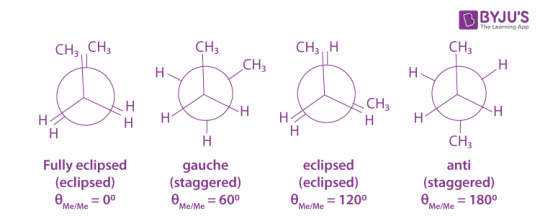
These molecules have different shapes because of their rotation! That’s important because different conformations have different energies!
Basically — molecules are different, even if they have the same amount of atoms etc. It depends on their 3D structure. I remember my professor talking about the “Contergan”-scandal in the 60s:
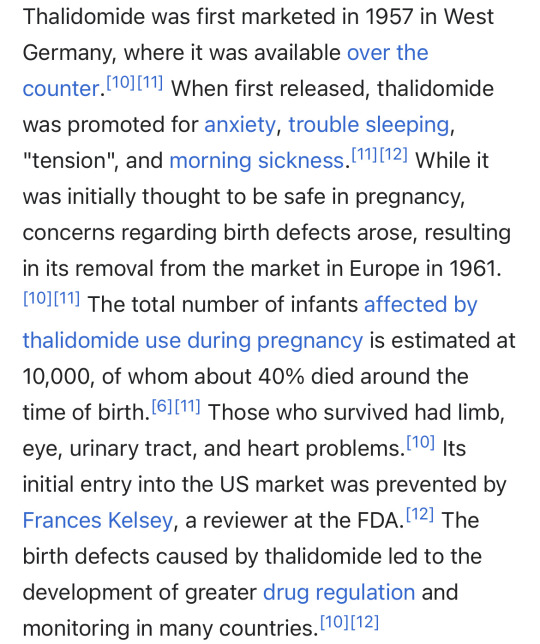
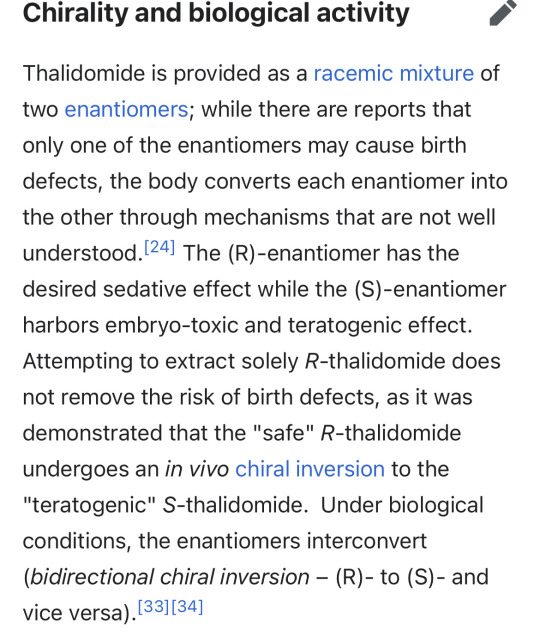
Definitely very important and interesting!
(Also I know this is very short because that’s a HUGE topic but I hope I could help you a little!)
38 notes
·
View notes
Text
"weren't we the stars in heaven?"
word count: 1978
warnings: angst ???
notes: title is from the song linked above -- kinda some fluff in this but mostly just sad LMAO </3 also im using this as an opportunity to say all of the fic writers here are so inspiring i actually get sm motivation from u guys !! ily forever
Water laps at your fingertips. It’s so very cold; you imagine the icy feeling crawling up your arm until it has frozen your entire body. You’d like to be stuck here for the rest of eternity, the late-winter sky covering the world like a blanket. Most of the sounds around you are muffled, save for the occasional words exchanged between you and Matty.
You’re sitting with him at the edge of an old and worn pier. Initials and hearts and expletives are carved into it all over, and many of the boards have fallen apart, but this is your place. You’ve come here often with Matty over the many years of your friendship. A small, quiet pond. A few lilies adorn where the land slips into water, but aside from that, the scene is entirely unremarkable. There was never a spoken reason why you returned here with him so many times. It was a sort of ritual at this point. After the first night you found the place, a night where you were both a little too stoned and the world was spinning far too quickly, it had become a sanctuary.
Matty watches your fingers continue to swirl through the water, spiraling around and around to create little whorls. “What are you thinking about?” he asks you softly.
You hear the words but they don’t seem to register. Matty’s voice is far away, calling you from a universe where things are different. He says your name this time, a little louder than before.
“Hm?” You lift your head and sit up straighter to get a good look at him. A smile is spread across his face, but you can detect the sadness behind it. It’s a look of mourning, the knowledge of the loss that can’t be avoided for much longer.
Matty repeats himself for you. “I asked what you’re thinking about right now.” He nudges you with his elbow, adding, “You seem a bit preoccupied.”
There’s a lump in your throat. He’s pretending not to know and you’re going to have to say it. Part of you wants to be furious, wants to scream over the fact that he’s acting like he forgot that this is his last day before leaving with the band. You find you can’t truly be angry, though. You saw the tears pooling in his eyes when he told you a month ago that he would be leaving. Even then, you had known it was an opportunity he couldn’t miss. The world was ready for The 1975’s first tour, and it would be nothing but selfish to get on your knees and beg for him to change his mind.
You take a breath to collect yourself before answering his question. “Thinking about missing you.”
His eyes quickly dart away from you. There’s not much time left to act like things are normal. You don’t want to act like things are normal. You want to tell Matty everything, you want to show him every piece of your heart. You want to expose how it beats for him.
Matty sighs heavily, laying on his back to look up at the sky. You do the same – maybe it’ll be easier if you don’t have to face each other. The sheet of clouds is untouched, obstructed only by the occasional bird gliding past. An anomaly within an infinite expanse of nothing. Something about this makes you reach for Matty’s hand. You lace your fingers with his and squeeze. He squeezes back.
He’s still there.
“I just don’t want things to be weird. Or complicated,” you tell him, voice barely above a whisper.
Matty laughs at this. Not a mean laugh, but one of surprise. “You say that like it’s not already complicated.”
You laugh as well, half from your nerves and half from relief. At least he knows. He knows there’s something clearly aching to be said. You start to wonder if it was wrong to wait until it was far too late to tell him. You ask yourself what even constitutes “too late.” You find that you’re not sure. There’s a pause between your laugh and your next words. “What if we don’t see each other again?”
“That won’t happen,” Matty says definitively. He’s still staring straight up, no turning of the head to drink in your image. His words are a half-truth, though, and you can hear it in his voice. He’ll certainly try to come back, to call you, to pay you visits, to give you kisses that clearly run deeper than “just friends.” However, it’s a slim likelihood that this happens. The ever-present hand of time will push you both onwards, stealing Matty from you. You feel this in your heart. You pray that your heart knows nothing.
You’re acutely aware of the increased pressure Matty has on your hand. You sneak a glance over and see that his eyes are shut. You notice that even his eyelashes are pretty, and this sends a pang through your heart. You never want to stop discovering his beauty. The selfish depths of your heart want Matty to remain your own little secret; you never want to share him with the world. This is not where he belongs, though. There is a long stretch of road waiting for him, and, if nothing else, you would still be there with open arms at the end of it.
Matty shuffles his body closer to yours, finally making the dreaded eye contact. No words are exchanged, but you both seem to understand what the other is thinking. You turn on your side and press a kiss to his shoulder. “This could have been so good,” you murmur against his skin.
“I know.”
You allow your lips to linger for a moment. The sky is darkening now. Maybe hours have passed or maybe you were unlucky and got here just moments before sunset. It doesn’t matter, though; you can feel time slipping through your hands, and suddenly you feel like an idiot. There were so many times you almost did it, almost blurted out, “I think I’m in love with you.” The words feel so natural on your tongue when it’s for Matty. It would have been so easy for your mouth to let the sounds slip out. Now you’re here. You never said it, but Matty knows, and the act of actually voicing it is moot.
Matty’s thumb rubs soft circles on your hand, an attempt to ease the pain. His touch burns into your skin. You savor it. Quiet breathing fills your ears, and you let the combination of this and Matty’s skin on yours ease your mind to prevent your next words from becoming stuck in your throat.
Just as your lips part, however, Matty fills the void for you. “I really do love you, you know. I think I love you in every way imaginable, and in all the ways no one has thought of yet.”
A white hot flash of something sears through you – it’s an emotion you can’t put a name to, although it doesn’t particularly need a name. You know what it’s calling you to do. Without much thinking, you adjust your position to gingerly hold yourself above Matty. Ease of access to his lips.
You intertwine yourselves together. It’s terrifying and it’s bliss and you hope it never has to end. This isn’t the first time you’ve kissed him, but it's noticeably different. This time is more tender, and he’s sweeter and softer than you had remembered. Matty’s hands aren’t greedy, either. He holds you to him and his touch roams your body, but he’s gentle. You’re both starving for each other, but you don’t want to miss a single second of this. You need Matty’s lips engraved in yours – something you wouldn't be able to forget, even when he is long gone.
His chest is rising and falling rapidly and you can feel his reluctance as your skin parts from his. Pupils dilated, his forehead comes to rest against yours. Warm breath tickles your nose and the absurdity of it all hits you. You can’t help but giggle. Matty’s expression shifts from serious to puzzled, and then he’s laughing with you. The familiar sound of his laughter helps to soothe your racing heart.
You push yourself into a sitting position now, no longer laying over top of Matty’s body. He does the same, and while your attention is on getting comfortable again, Matty takes the opportunity to catch you off guard. He uses two fingers to tilt your chin up, forcing eye contact before he begins to press kisses to every feature on your face. First your forehead, then your cheeks, the tip of your nose, your chin, up and down your jaw. Your eyes flutter closed and you hum contentedly. There’s a hesitation before he meets your lips again, but you lean into it deeply when he does. You move symbiotically with one another, souls melting into each other. This feeling transcends the human experience. This must be what a supernova feels like, heat pouring out from the center of each body as a final farewell.
Your desire hasn’t been fulfilled to completion when the kiss is broken, but you know this cannot go on forever. “I really do love you too, Matty,” you finally respond. A pause, and then, “And I can’t help but feel guilty for not saying it sooner.”
Matty is quiet for a long time before saying anything else. You almost think he didn’t hear you, until he simply says, “I don’t think we ever needed to say it.”
You furrow your brow at this. “Don’t you wish we could’ve been more than this?”
“I think we would have ended up here anyway. ‘Course I wish things were different, [Y/N]. I would travel to the ends of the earth to find you again. But you’re a smart girl, you know I can’t stay here forever. And I haven’t regretted a single moment of whatever this is.” He gestures vaguely with his hands, unsure of the words to describe what exists between him and you. “D’you know what I mean?”
Once again, you find yourself wanting to be furious. He should be crying, he should be miserable, he should be apologizing for never making this easy. You shake yourself back to reality because you know Matty is right. His words hit you with a certain level-headedness that you hadn’t been ready for. You don’t regret any of this either. Despite it all, he was always there. You suppose that’s all that ever truly mattered; at the very least, it’s what you’ll tell yourself until you believe it. “I know what you mean,” you manage to say.
“Thank you, darling.”
It’s truly getting late now. The night brings an impending sense of doom, regardless of all that has transpired. Silence has fallen over the two of you now; there’s not much left to say, anyway. He told you he can’t stay here forever, and you’re proud of him for it. You make peace with the idea of going home, letting the night draw to a close.
Before you know it, you’re standing with Matty at your parked cars. You cast a glance back at the pond – you’re not sure you’ll come back. Maybe you can when Matty comes back, for old times’ sake. For now, though, you’re faced with the decision of parting words. Of course you’ll see him again tomorrow morning just before he packs up and leaves, but it feels wrong not to say something. Suddenly there’s intense pressure on you; you need to say something monumental, something life-altering that he could never forget. But you don’t. Instead, you leave a chaste kiss on his cheek and say the only words that you can seem to find.
“Don’t be a stranger.”
“I never could be.”
#dont be mean about this one u guys#this fic definitely isnt me projecting#no way def not#matty healy#matty healy fic#matty healy x reader#fem!reader#fluff#angst#naomi's writing !#Spotify
170 notes
·
View notes
Text
In the wake of the stunning U.S. Supreme Court decision in Dobbs v. Jackson Women’s Health Organization, which abolishes a constitutional right to an abortion, there are many things to unravel in Justice Samuel Alito’s majority opinion, three concurrences by Chief Justice Roberts and Justices Clarence Thomas and Brett Kavanaugh, and a dissent from the Court’s three liberal justices. But something that jumps right off the page from the Thomas concurrence like a terroristic threat is his conclusion that having discarded Roe, the Court should next move on to the landmark decisions that relied on similar constitutional foundations. He writes:
In future cases, we should reconsider all of this Court’s substantive due process precedents, including Griswold, Lawrence, and Obergefell.
Griswold v. Connecticut was the 1965 decision that struck down state contraception bans via a finding of a constitutional right to privacy. Lawrence v. Texas was the 2003 decision that struck down state “sodomy laws” and fully legitimized same-sex relationships. And Obergefell v. Hodges was the 2015 decision that recognized same-sex marriages as constitutionally protected. All three depended to some degree on the doctrine that the Fourteenth Amendment’s due process clause was not simply procedural, but conferred some “substantive” rights. Thomas is calling for the conservative counter-revolution now raging due to the brazen dismissal of precedents in Dobbs to proceed to the next logical targets.
In this step Thomas is reinforcing his reputation for constitutional radicalism, or perhaps burnishing his credentials as being braver, bolder, and more public in that radicalism than his conservative colleagues. In the majority opinion in Dobbs, Alito sought to head off any immediate speculation that the fall of Roe v. Wade and Casey v. Planned Parenthood would lead to the destruction of other key privacy rights;
As even the Casey plurality recognized, “[a]bortion is a unique act” because it terminates “life or potential life.” 505 U. S., at 852; see also Roe, 410 U. S., at 159 (abortion is “inherently different from marital intimacy,” “marriage,” or “procreation”). And to ensure that our decision is not misunderstood or mischaracterized, we emphasize that our decision concerns the constitutional right to abortion and no other right. Nothing in this opinion should be understood to cast doubt on precedents that do not concern abortion.
But try as he may, Alito cannot limit the damage he has inflicted with the constitutional dynamite of Dobbs. We are now fully in a new and dangerous era of Supreme Court jurisprudence in which few precedents are safe.
#article#full article#us politics#abortion#reproductive rights#lgbtq rights#lgbtq#lgbt#contraception#privacy#clarence thomas#sodomy
486 notes
·
View notes
Text

Writeblr (Re)-Introduction
« A B O U T »
Hello there! Call me Ink (she/her pronouns). I'm a black female writer in my late 20s. I've been on writeblr since 2018 (according to my ~ archive ~) and I've probably made a couple intros since then, but nothing quite as organized/formal as this so - here we are!
I primarily write contemporary/literary fiction (which I know isn't super prevalent on writeblr so happy to bond with any fellow litfic writers). I enjoy writing deeply introspective, character-driven stories (I think because, I'm learning, I'm a deeply inspective person lol) so if that's your cup of tea then check out my WIP(s) below :)
Links/places to find me (if you are on any of these sites, pls connect with me! I'm actively looking for other writers to follow)
Wattpad
Instagram/Twitter: @rianeblackwell (my writer pen name!)
Random things about me/how I run my blog
I'm a dual-degree bio graduate student so I spend my days pipetting shit in a lab
outside of writing, I enjoy reading (when I have the patience and bandwidth for it), watching anime (fav: fruits basket; currently watching: one piece), (guided) painting, and...sleeping?
I am ask game and tag game friendly! Though it may take me time to respond to tag games.
You will typically find me posting my random thoughts about things (tagged: inkoverted thoughts) - as I said I am introspective af so this constitutes like 90% of what I post. my writing you say? yeah we're still working on growing the gonads to post about that consistently or at all :^)
Because I have so many thoughts, I just started a writeblr discourse series called Spilled Ink (tagged: spilled ink) so that I'm not just shouting into the void and can (hopefully) have people talk back to me and share their opinions
I am always down to talk! seriously. a message in my ask box will never fail to brighten my day so come talk to me about anything and everything.
« W I P S »
Again, unlike most on writeblr (I feel like such an oddball here sometimes), I do not have a trillion WIPs to list and advertise. I'm very much the person that prefers to focus on one WIP at a time. That said, I do have one main WIP and a side-WIP that I started out of spite (and haven't touched since):
My Dearest Enemy (YA literary fiction) | WIP intro | WIP tag | read on wattpad
a coming-of-age story about a 17-year-old aspiring artist whose artwork is deteriorating as she struggles to come to terms with the death of her father a year prior. as the story unfolds she meets a series of new people who force her to contend with the bleak reality she's settled for. the emotional journey that results opens up her world, and ultimately unearths a shocking truth.
Untitled Romance WIP (Contemporary fiction) | no tag or intro just yet
a story about a black female physician assistant living a life of self-sabotage as she jumps from one unfulfilling "relationship" to another. she's been convinced, by society and past experiences, that someone as "dark" as her needs to settle for any form of affection she can get. fairly tale love stories with happy endings don't happen to people like her. But when her crush from high school who unknowingly started her streak of self-sabotage suddenly reappears in her life, she has to decide whether it's worth giving him another chance.
31 notes
·
View notes